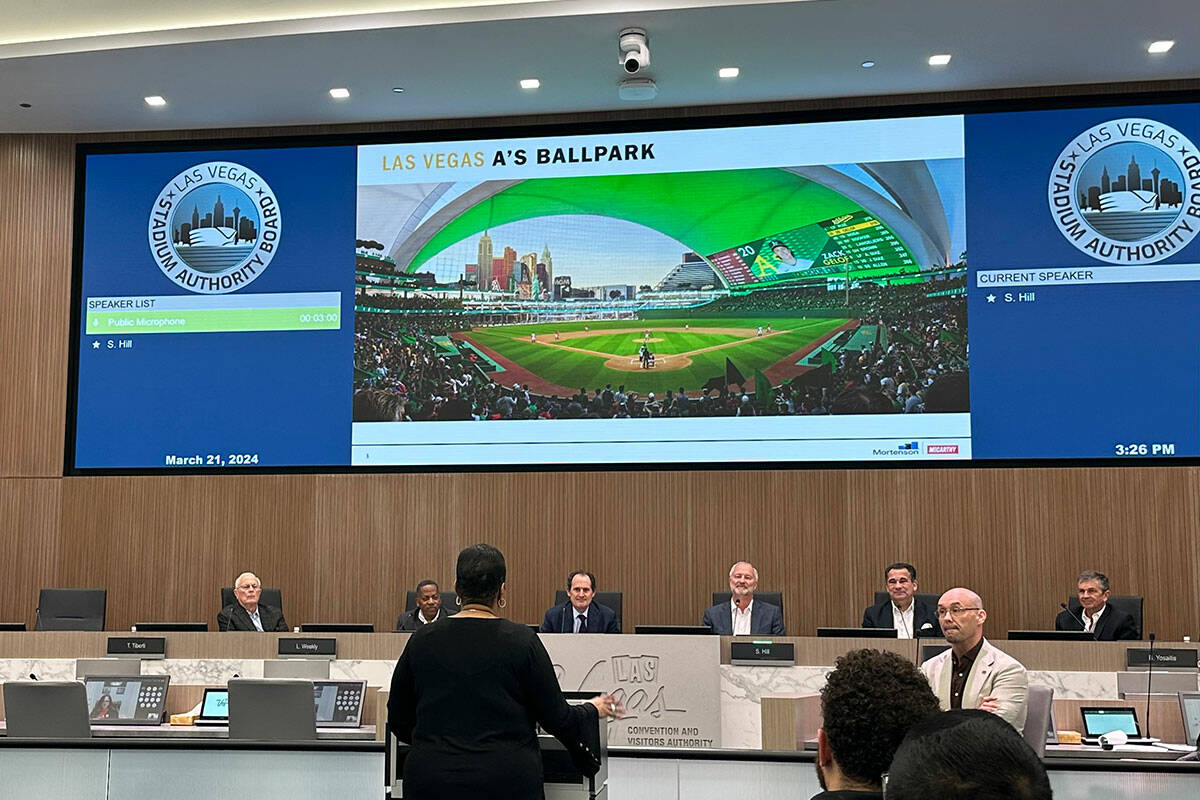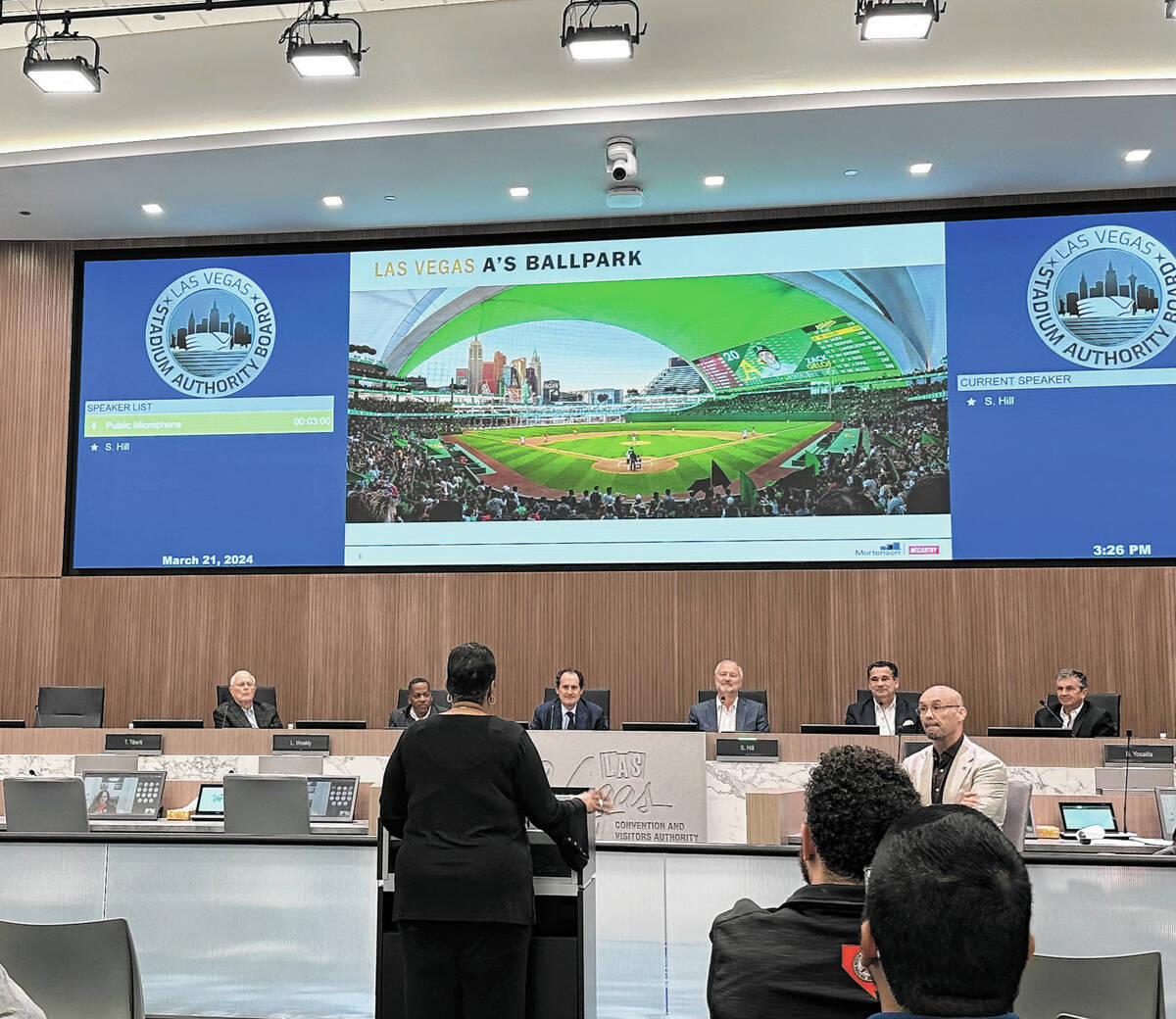A’s community benefits plan approved; first of 4 needed for stadium
The Oakland Athletics community benefits plan was unanimously approved Thursday by the Las Vegas Stadium Authority Board.
It’s the first of four agreements that must be approved before the A’s can begin construction on the team’s $1.5 billion stadium.
“I’ll echo what Steve Hill said, I think it’s groundbreaking in a lot of its ways,” A’s President Dave Kaval told the Las Vegas Review-Journal following the meeting. “Especially with the enforcement mechanisms to make sure the community gets all these things in terms of construction and workforce diversity and hiring and also operations. Then the $2 million-plus a year that can be distributed to a variety of community groups to ensure that they’re getting benefits out of this.”
The benefits plan, spelled out in Senate Bill 1, the A’s public financing mechanism, includes various requirements including a minimum annual financial commitment — $500,000 during construction and $2 million after the stadium is operational — art requirements, workforce diversity goals for both construction and stadium workers, living wages for ballpark staff and educational elements.
“I think it’s really important that the living wage is in there,” Kaval said. “We have all these union agreements with the Culinary Union, building trades and all of those things together can ensure that people can work on the stadium — both building it and when it’s operating — and raise their families.”
Workforce requirements
When the stadium is complete, 60 percent of workers at the ballpark will be required to be women, minority, veteran or disabled.
Lynn Littlejohn, vice president of community empowerment for Mortenson Construction, part of Mortenson-McCarthy, the joint venture that will serve as construction mangers on the ballpark project, said she’ll ensure workforce requirements that call for at least 51 percent of the workforce during the construction of the stadium be made up of women, minorities, veterans and disabled workers are met.
“We were the construction manager for Allegiant Stadium, which also had these same (workforce) elements in this community benefits agreement and we exceeded all of those,” Littlejohn said. “… you have our commitment and the full backing of our organizations that we will endeavor to have the same outcomes for this A’s ballpark that we had for Allegiant Stadium.”
The A’s also will be required to contract 15 percent of work on the stadium to small locally owned businesses.
While a scheduled April board meeting isn’t happening, the next planned Stadium Authority meeting will be held May 16.
It’s possible that the draft development agreement, which will include how the A’s will finance and construct the the 33,000-capacity ballpark, will be presented at that meeting, according to Stadium Authority Chairman Steve Hill. The other two agreements — the lease and non-relocation agreements — also are expected to be on May’s agenda, he said.
‘In our DNA to be community-minded organization’
Kaval noted that the team has demonstrated its community focus by already donating more than $300,000 in the last year alone. That money went toward youth baseball organizations, Big Brothers and Big Sisters of Southern Nevada and the Public Education Foundation.
”I think it’s showing that we’re willing to legally agree to it,” Kaval said. “It’s in our DNA to be a community- minded organization. That’s Major League Baseball. That’s the A’s while we’re in Oakland. We’re going to lead with that.”
That, he said, is why the team started even before it was legally required to do so. “We’re going to amp things up and continue to invest and make sure we’re in the community with the Little Leagues, with the school groups, with the chambers and ensure we have a great experience in these middle years before we open in 2028.”
Kaval said that including an art program in the community benefits agreement was as important as any other aspect. The program calls for using local artists to create pieces at the stadium and working with the Neon Museum to include some of their vintage hotel signs.
“It’s all about culture,” Kaval said. “Having the baseball stadium is awesome, but if we can have this incredible building, that is almost a piece of art in itself, and have local artists creating work and then actually putting it on display there so millions of people can see it, that’s a win for everyone.”
Contact Mick Akers at makers@reviewjournal.com or 702-387-2920. Follow @mickakers on X.




















